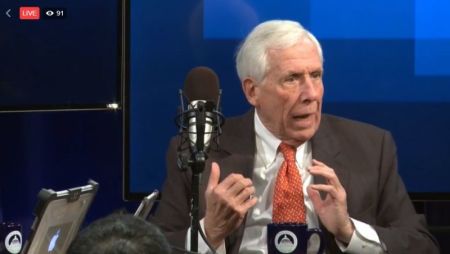The Church Has 'Fundamentally Failed' on Religious Freedom, Frank Wolf Says

As the United States celebrated National Religious Freedom Day Tuesday, former Congressman Frank Wolf, the original author of the International Religious Freedom Act, offered a very pessimistic view about the future of religious freedom in America and around the globe. And he believes the Church has done very little to help.
"[O]verall, the Church has fundamentally failed," Wolf, who served two decades representing Virginia's 10th congressional district and now serves as a senior fellow at the 21st Century Wilberforce Initiative, said Tuesday on the "Washington Watch" radio program. "Most churches used to have a Religious Freedom Sunday where they would bring in somebody from Sudan and China. And now, they are almost all gone.
"Unless there is change in the hearts and minds of people, I think the fundamental failure has been the Church. Dietrich Bonhoeffer said, 'If you don't speak and you don't act ...' I don't see the Church speaking and I don't see the Church acting."
While expressing disappointment with the Church failing to raise awareness about religious freedom and persecution issues at home and abroad, Wolf added that some pastors, priests and rabbis may need to do what Martin Luther King Jr. did.
"I think we need some men like Martin Luther King," he said. "I think we need pastors to go to jail.
"They may very well have to go to jail to wake up this country."
Family Research Council President Tony Perkins hosted the special Religious Freedom Day broadcast. When he asked Wolf, who authored the International Religious Freedom Act in 1993 and is the namesake of the new version of the law passed in December 2016, if he believed religious freedom in the world today is "better protected" than it was 50 years ago, the former congressman said he believes religious freedom around the world is at "greater risk."
The U.S. Congress doesn't have the leaders that it used to — such as Henry Hyde and Tom Lantos — who pushed for religious freedom, especially in countries that receive U.S. funding, he pointed out.
"We have 5.5 billion people living in repressive nations," Wolf stated.
Wolf mentioned how the Washington, D.C.-based law firm Squire Patton Boggs is lobbying on behalf of the Sudanese government for the U.S. government to permanently repeal severe sanctions. Sudan ranks as the 4th worst country in the world when it comes to Christian persecution.
"When Patton Boggs takes on an indicted war criminal, you have to wonder where we have gone," Wolf said.
"From 1980 to 1988, if any law firm in this town said they wanted to represent that Soviet Union, Reagan would have cracked down on it," Wolf asserted. "[SPB] represents [Omar al-]Bashir, who is an indicted war criminal. Yet you have the most powerful law firm in the city representing him. They represent China."
Wolf stated that religious freedom today "is worse off because we don't have the leadership now that we really have [had]."
When asked if he thinks there is a "change on the horizon" given the fact that the Trump administration has vowed to protect religious freedom, Wolf declared that he is "not encouraged" because of the fact that religious freedom no longer seems to be an important issue for not only millennials but also the Church itself.
"I go on to these college campuses, Christian colleges," Wolf, who has 16 grandkids, said. "These kids are really not that interested."
Wolf also pointed out that there is much anti-semitism on American college campuses today and called the Boycott, Divestment and Sanctions movement against Israel a form of "soft anti-semitism."
Wolf called on churches across the nation to hold Religious Freedom Sundays and to hold events in which persecuted Christians from abroad are invited to speak about the persecution they faced in their home countries.
He also called on churches to either visit their congressional representatives and senators or invite them out to their churches to ask what they are doing to help promote religious freedom across the globe.
Wolf pointed out that there are also domestic religious freedom issues that the U.S. needs to work on.
"If you are a American person and you believe that marriage is between a man and a woman and you work for a high-tech company, you are not going to go very far," he stated. "We have some problems in this country as well as outside."





















